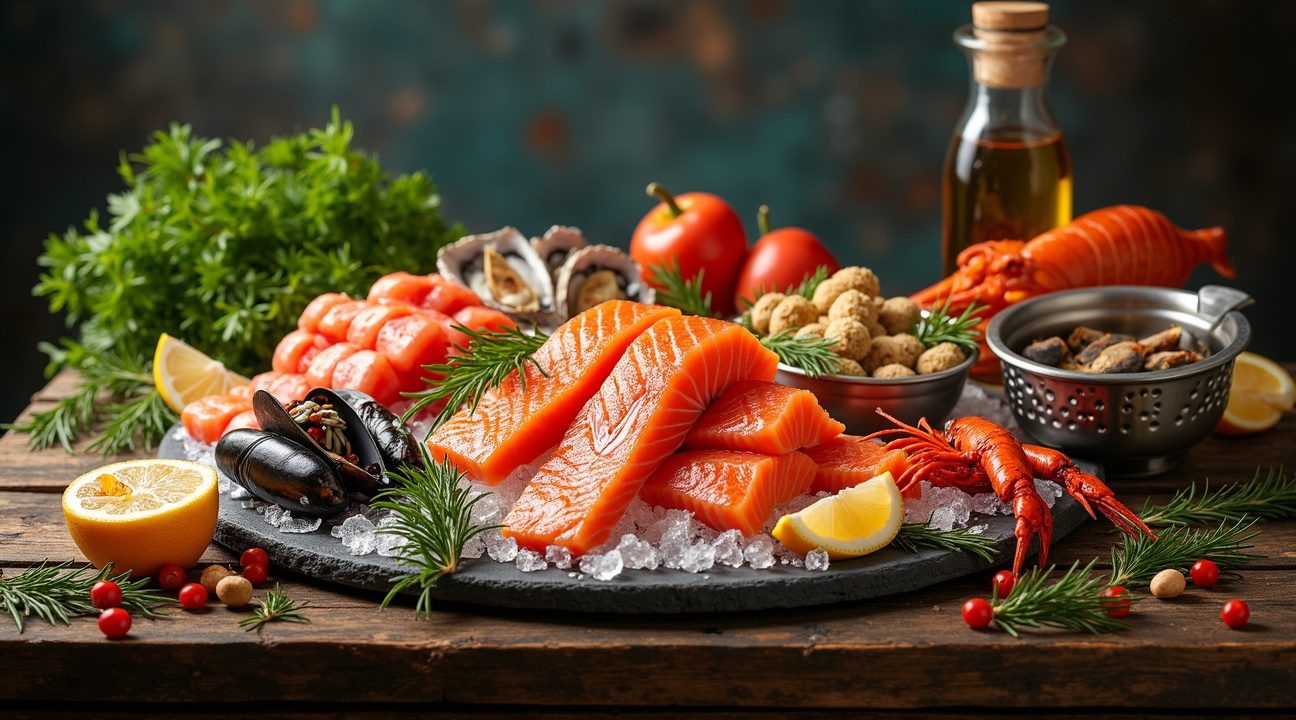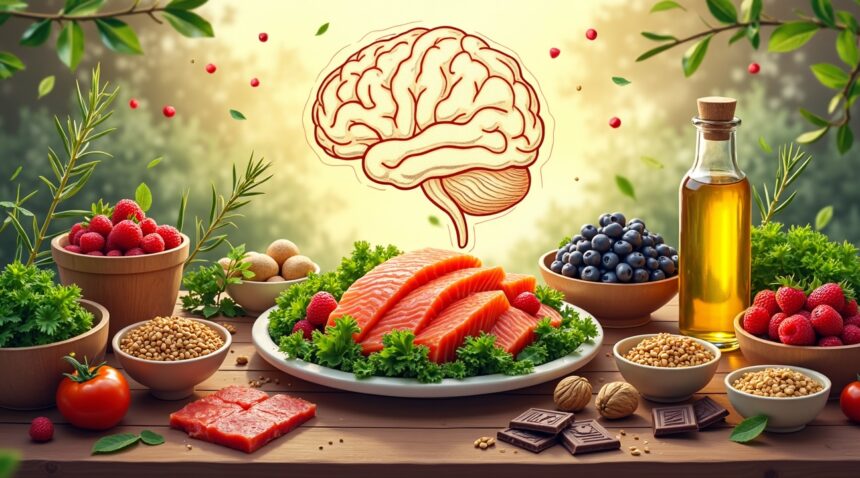Research consistently demonstrates that following a Mediterranean eating pattern can reduce cognitive decline risk by approximately 18% while simultaneously boosting heart health through specific nutrient-dense foods.
The most effective approach combines fatty fish rich in omega-3s, dark leafy greens, berries, nuts, and olive oil to create synergistic protection for both cardiovascular and cognitive function.
Key Takeaways
- The Mediterranean diet delivers measurable cognitive benefits, with adherents consuming 4.2 servings of fruit and 4.4 servings of vegetables daily compared to only 2.3–2.8 servings for those with low adherence.
- Fatty fish like salmon, sardines, and mackerel provide omega-3 fatty acids that enhance memory formation, reduce triglycerides, and support optimal brain cell communication when consumed 1–2 times per week.
- Dark leafy greens such as kale and spinach contain vitamin K, lutein, and folate that protect brain tissue from inflammation while supporting healthy blood vessel function throughout the cardiovascular system.
- Nuts, seeds, and olive oil deliver monounsaturated fats and antioxidants that lower LDL cholesterol, reduce blood clotting risk, and provide direct neuroprotective benefits through compounds that cross the blood-brain barrier.
- Combining these nutrient-dense foods with regular physical activity, smoking cessation, and proper weight management amplifies their protective effects, creating synergistic benefits for both heart and brain health.
Your Brain Can Be 18% Sharper With This Proven Eating Pattern
I’ve witnessed countless dietary trends come and go, but the Mediterranean diet stands apart with rock-solid scientific backing. Research consistently demonstrates that following this eating pattern can reduce cognitive decline risk by approximately 18% while simultaneously boosting heart health.
The numbers tell a compelling story. People who stick closely to Mediterranean eating habits consume 4.2 servings of fruit and 4.4 servings of vegetables daily. Compare this to those with low adherence, who manage only 2.3 to 2.8 servings per day. This difference translates directly into better global cognition scores across multiple studies and meta-analyses.
Brain imaging reveals even more dramatic benefits. Individuals who follow the Mediterranean diet closely maintain larger temporal lobe and hippocampal brain volumes—the exact regions responsible for memory formation and learning capacity. These structural advantages suggest the diet doesn’t just prevent decline but actively preserves brain architecture.
Core Foods That Power Brain and Heart Health
The Mediterranean approach emphasizes specific food categories that deliver maximum cognitive and cardiovascular benefits:
- Vegetables form the foundation, providing antioxidants and fiber that protect neural pathways
- Fresh fruits supply natural sugars and compounds that support brain cell communication
- Whole grains deliver steady energy and B vitamins essential for cognitive function
- Nuts and legumes offer healthy fats and protein that stabilize blood sugar
- Fish provides omega-3 fatty acids crucial for brain structure and heart rhythm
- Olive oil contains monounsaturated fats that reduce inflammation throughout the body
I find it fascinating how culinary traditions developed over centuries naturally align with modern neuroscience findings. The Mediterranean pattern isn’t a restrictive diet but rather a sustainable lifestyle that makes healthy choices feel effortless.
Studies consistently show that even moderate improvements in Mediterranean diet adherence yield measurable cognitive benefits. Starting with just one or two food swaps—like replacing butter with olive oil or adding a daily handful of nuts—can begin the process of brain protection. The key lies in consistency rather than perfection, making this approach accessible for anyone serious about preserving mental sharpness and heart health for years to come.

Fatty Fish: The Omega-3 Powerhouse Your Heart and Brain Crave
When I examine the connection between diet and cognitive health, fatty fish consistently emerges as one of the most powerful foods for supporting both heart and brain function. These remarkable marine sources deliver omega-3 fatty acids that act as essential building blocks for optimal neurological performance and cardiovascular wellness.
Salmon, sardines, mackerel, trout, herring, and kippers stand out as exceptional choices because they contain concentrated levels of EPA and DHA, the two most beneficial forms of omega-3 fatty acids. I’ve found that these nutrients work directly at the cellular level to enhance memory formation and protect against age-related cognitive decline. The brain relies heavily on these healthy fats to maintain the integrity of neural membranes and facilitate efficient communication between brain cells.
Research consistently shows that people who consume fish at least one to two times per week demonstrate measurably improved brain function compared to those who rarely include seafood in their diet. This regular consumption pattern appears to slow mental decline significantly, offering a simple yet effective strategy for long-term cognitive preservation. Coffee myths aside, fatty fish represents one of the most scientifically supported dietary interventions for brain health.
Heart-Healthy Benefits Beyond the Brain
From a cardiovascular perspective, omega-3 fatty acids from fatty fish provide remarkable benefits by lowering triglycerides without negatively affecting LDL cholesterol levels. This unique property makes fish consumption particularly valuable for people managing multiple aspects of heart health simultaneously. The anti-inflammatory effects of these omega-3s help reduce arterial inflammation and support overall cardiovascular function.
I recommend incorporating a variety of fatty fish species into weekly meal planning to maximize both flavor and nutritional benefits:
- Salmon – offers mild taste and versatility, ideal for beginners.
- Sardines and mackerel – provide more intense flavors and higher omega-3 content per serving.
- Trout – delivers a delicate texture suited to grilling, baking, or steaming.
Fresh, frozen, and canned options all retain significant nutritional value, making fatty fish accessible regardless of budget or location. Canned sardines and salmon offer convenience and affordability while maintaining their omega-3 content. Wild-caught varieties typically contain higher omega-3 levels than farm-raised options, though both provide substantial benefits.
Beyond traditional fish, shellfish and crustaceans offer complementary nutritional advantages for brain and heart health. Oysters, mussels, clams, crayfish, shrimp, and lobster provide exceptional levels of vitamin B12, a crucial nutrient for preventing memory loss and supporting proper neurological function. This vitamin works synergistically with omega-3 fatty acids to enhance cognitive performance and protect against neurodegenerative processes.
Vitamin B12 deficiency has been linked to accelerated cognitive decline and memory problems, making these shellfish valuable additions to a brain-healthy diet. Many people, particularly those over 50, struggle to absorb adequate B12 from other sources, making shellfish consumption an effective dietary strategy for maintaining optimal levels.
Preparation methods significantly impact the retention of beneficial nutrients in both fish and shellfish. Gentle cooking techniques like steaming, poaching, or light grilling preserve omega-3 content better than high-heat frying. I suggest experimenting with herbs and spices to enhance flavors without masking the natural taste of quality seafood.
Sustainability considerations play an important role in seafood selection. Choosing species from well-managed fisheries ensures continued availability of these nutritional powerhouses while supporting environmental conservation. Many grocery stores now provide sustainability ratings or certifications to guide purchasing decisions.
For optimal results, I recommend distributing fish consumption throughout the week rather than consuming large portions infrequently. This approach maintains steady levels of beneficial omega-3s in the bloodstream and provides consistent support for both heart and brain function. Even modest portions of fatty fish deliver meaningful health benefits when consumed regularly as part of a balanced diet focused on cognitive and cardiovascular wellness.

Plant Powerhouses That Fuel Your Mind and Protect Your Arteries
I’ve discovered that certain plant foods pack an extraordinary nutritional punch, delivering compounds that simultaneously protect both cognitive function and cardiovascular health. These foods work through multiple pathways, offering sustained energy while fighting inflammation and oxidative damage that can compromise both brain and heart performance.
Dark Leafy Greens: Nature’s Brain and Heart Protectors
Dark green leafy vegetables represent some of the most nutrient-dense foods available for dual brain-heart protection. Kale, spinach, collards, and broccoli contain exceptional concentrations of vitamin K, lutein, folate, and beta carotene. Research consistently demonstrates that higher consumption of these vegetables correlates with slower cognitive decline and improved vascular heart health.
Vitamin K in these greens doesn’t just support blood clotting—it plays a crucial role in protecting brain tissue from inflammation. Lutein, the same compound that gives these vegetables their vibrant color, accumulates in brain tissue where it acts as a protective filter against harmful blue light and oxidative stress. Folate supports the production of neurotransmitters while simultaneously helping to regulate homocysteine levels, an amino acid that can damage both brain and arterial walls when elevated.
I recommend incorporating at least two servings of dark leafy greens daily. Steaming lightly preserves most nutrients while making some compounds more bioavailable. Creative cooking techniques can transform these vegetables into appealing dishes that make meeting daily requirements effortless.
Berries and Whole Grains: Sustained Cognitive and Cardiovascular Support
Berries deliver concentrated antioxidant power that specifically targets brain cell protection. Blueberries, strawberries, and blackberries contain anthocyanins and flavonoids that cross the blood-brain barrier, directly protecting neurons from oxidative stress. These compounds may delay age-related brain decline while supporting healthy blood vessel function throughout the cardiovascular system.
The antioxidants in berries work by neutralizing free radicals before they can damage cellular structures. This protection extends to the delicate endothelial cells lining blood vessels, helping maintain arterial flexibility and reducing inflammation that contributes to heart disease. Regular berry consumption has been associated with improved memory formation and enhanced communication between brain cells.
Whole grains and legumes provide the foundation for sustained cognitive and cardiovascular performance through their complex carbohydrate content and folate concentrations. Options include:
- Cracked wheat and oats for sustained energy release
- Whole-grain couscous as a versatile base for nutrient-dense meals
- Sweet potatoes for natural sweetness plus fiber and potassium
- Chickpeas and black beans for protein, fiber, and memory-boosting B vitamins
These foods deliver glucose to the brain gradually, preventing the energy spikes and crashes that can impair cognitive function. The steady fuel supply supports consistent mental performance while the fiber content helps regulate cholesterol levels and blood pressure. Folate in these foods supports the synthesis of neurotransmitters like serotonin and dopamine while helping to maintain healthy homocysteine levels.
I find that combining these plant powerhouses creates synergistic effects. A breakfast featuring oatmeal topped with berries provides both immediate antioxidant protection and sustained energy. Lunch salads built around dark leafy greens with legumes offer comprehensive nutrition that supports both cognitive clarity and cardiovascular health throughout the afternoon.
The beauty of these plant foods lies in their dual action—they don’t require choosing between brain health and heart health. Instead, they optimize both systems simultaneously through overlapping protective mechanisms. Regular consumption creates cumulative benefits that become more pronounced over time, making these foods essential components of any long-term health strategy.
The Surprising Brain-Boosting Power of Nuts, Seeds and Healthy Fats
I’ve discovered that nature’s smallest powerhouses pack an extraordinary nutritional punch for both cardiovascular and cognitive health. Nuts, seeds, and healthy oils deliver concentrated doses of essential nutrients that work synergistically to protect your heart and sharpen your mind.
Walnuts stand out as exceptional brain food, earning their reputation through their rich omega-3 fatty acid content. These heart-shaped nuts contain alpha-linolenic acid, which helps lower triglycerides while enhancing overall vascular health. The omega-3s in walnuts may also decrease blood clotting, reducing the risk of cardiovascular events. I recommend incorporating a handful of walnuts into your daily routine, whether sprinkled on salads or enjoyed as a mid-afternoon snack.
Seeds That Support Memory and Heart Function
Seeds deserve equal attention for their impressive nutrient profiles. Sesame seeds and cocoa seeds contain powerful combinations of minerals and compounds that directly benefit brain function. These tiny nutritional dynamos provide:
- Zinc, which supports neurotransmitter function and memory formation
- Magnesium, essential for proper nerve transmission and heart rhythm
- Vitamin B6, crucial for brain development and cognitive performance
- Flavonoids, potent antioxidants that protect blood vessels and enhance alertness
I often tell people that morning coffee becomes even more beneficial when paired with these nutrient-dense seeds.
Extra virgin olive oil represents another cornerstone of heart and brain health. This liquid gold contains abundant monounsaturated fats that actively reduce LDL cholesterol levels while providing robust antioxidant protection. The polyphenols in high-quality olive oil cross the blood-brain barrier, offering direct neuroprotective benefits.
The key lies in making strategic fat replacements throughout your diet. Swapping saturated and trans fats for these healthier alternatives creates measurable improvements in both cardiovascular and cognitive function. I encourage drizzling olive oil over vegetables, adding crushed nuts to yogurt, or blending seeds into smoothies.
Research consistently demonstrates that people who regularly consume these healthy fats experience better memory retention, improved focus, and reduced inflammation markers. The synergistic effect of combining different nuts, seeds, and oils amplifies their individual benefits, creating a powerful defense system for your most vital organs.
Storage matters significantly for maintaining the potency of these foods. I store nuts and seeds in airtight containers in cool, dark places to preserve their beneficial oils. Extra virgin olive oil should be kept away from light and heat to maintain its antioxidant properties. Fresh, properly stored healthy fats deliver maximum nutritional impact for sustained heart and brain health.
Herbs and Functional Foods That Enhance Memory and Blood Flow
I’ve discovered that certain herbs and functional foods offer remarkable benefits for both cardiovascular health and cognitive function. These natural compounds work by improving circulation and protecting delicate blood vessels throughout the body.
Cocoa: A Cardiovascular and Cognitive Powerhouse
Cocoa stands out as one of nature’s most impressive functional foods. It contains arginine, an amino acid that helps dilate blood vessels, promoting better circulation throughout the body. The flavonoids in cocoa act as powerful antioxidants that protect arteries from damage caused by oxidative stress. I often recommend dark chocolate with high cocoa content to clients looking to support their heart and brain health simultaneously. The higher the percentage of cocoa, the greater the concentration of these beneficial compounds.
Aromatic Herbs That Boost Brain Function
Several herbs demonstrate remarkable effects on memory and cognitive performance through their impact on blood flow:
- Rosemary enhances cerebral blood flow, which directly aids concentration and memory formation. I find that incorporating fresh rosemary into cooking or using rosemary essential oil can provide these cognitive benefits.
- Peppermint offers another fascinating example of how scent affects brain function. The aroma of peppermint has been shown to improve memory, making it an excellent choice for students or professionals who need mental clarity. I suggest keeping fresh peppermint nearby during work or study sessions.
- Saffron represents one of the most researched spices for cognitive health. It has demonstrated suggestive benefits for cognitive function, particularly in individuals with mild to moderate Alzheimer’s disease. While saffron can be expensive, even small amounts added to dishes may provide meaningful benefits. The world of iconic chef Andre Rush showcases how professional cooks incorporate such beneficial ingredients into their culinary creations.
These herbs and functional foods work synergistically to support both heart and brain health. By improving blood flow and providing antioxidant protection, they create an optimal environment for cognitive function while supporting cardiovascular wellness. I recommend incorporating these ingredients into daily meals and routines for maximum benefit.
Lifestyle Factors That Amplify Your Diet’s Brain and Heart Benefits
I’ve discovered that the most powerful brain and heart protection comes from combining smart food choices with comprehensive lifestyle habits. Regular physical activity works synergistically with nutrient-dense foods to maximize their protective effects on both cardiovascular and cognitive health. Maintaining optimal cholesterol, blood sugar, and blood pressure levels creates the perfect foundation for dietary nutrients to work at their peak efficiency.
Smoking cessation stands as one of the most critical steps anyone can take to enhance their diet’s benefits. I consistently observe that people who avoid tobacco while eating heart-healthy foods experience dramatically improved outcomes compared to those who smoke. Weight management amplifies these effects even further, as maintaining a healthy BMI allows nutrients to circulate more effectively throughout the body.
Strategic Food Combinations for Maximum Impact
The specific foods that deliver the greatest combined benefits create a powerful arsenal against cognitive decline and heart disease:
- Fatty fish like salmon and mackerel slow cognitive decline while simultaneously reducing harmful triglycerides
- Leafy greens such as spinach and kale support vascular health throughout the body while actively slowing memory loss
- Whole grains provide sustained brain energy and improve cholesterol profiles more effectively than refined alternatives
- Nuts and seeds lower dementia risk while enhancing blood vessel health and flexibility
- Berries combat oxidative stress and inflammation that damage both brain cells and arterial walls
- Olive oil reduces levels of brain-damaging proteins while lowering LDL cholesterol concentrations
I find that people who focus on these specific foods while maintaining active lifestyles see remarkable improvements in both mental sharpness and cardiovascular markers. The synergy between proper nutrition and healthy habits creates a protective effect that’s far greater than either approach alone. Morning coffee myths often overlook how even beverages can contribute to this protective framework when consumed mindfully.
Blood pressure management becomes significantly easier when combining these dietary strategies with regular exercise and stress reduction techniques. I recommend tracking key health markers to measure progress, as the improvements in cognitive function and heart health often become measurable within weeks of implementing these combined approaches. The cumulative effect of multiple lifestyle factors working together creates lasting protection that continues to strengthen over time.

Sources:
Mayo Clinic Health System, “Maximize Memory Function with a Nutrient-Rich Diet”
JAMA Network Open, “Association of Mediterranean Diet With Cognitive Decline Among…”
American Academy of Neurology, “Heart-Healthy Diets in Early Adulthood Linked to Better Brain Function in Middle Age”
Journal of Gerontology: Biological Sciences, “The Role of the Mediterranean Diet in Reducing the Risk of Cognitive Decline”
MedlinePlus Magazine, “Diets Rich in Fish and Vegetables May Boost Your Brain Power”
PLOS ONE, “Mediterranean Diet and Cognitive Health: Initial Results from the…”
Harvard Health, “Foods Linked to Better Brainpower”


